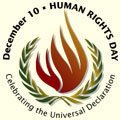Human Rights Day

Today is Human Rights Day. It has been celebrated since December 10th, 1948, when the United Nations first adopted the Universal Declaration of Human Rights. This year, in the aftermath of Abu Ghraib and the current reports of secret CIA prisons, the theme is significant:
Torture and Global Efforts to Combat It
Here are some excerpts from UN Secretary General Kofi Annan’s message today:
Fifty-seven years after the Universal Declaration of Human Rights prohibited all forms of torture and cruel, inhuman or degrading treatment or punishment, torture remains unacceptably common. Recent times have witnessed an especially disturbing trend of countries claiming exceptions to the prohibition on torture based on their own national security perceptions.
Let us be clear: torture can never be an instrument to fight terror, for torture is an instrument of terror.
Humanity faces grave challenges today. The threat of terror is real and immediate. Yet fear of terrorists can never justify adopting their methods. Nor can we be complacent about the broader prevalence of cruel and inhuman punishment, which in so many of our societies disproportionately affects the most vulnerable people: the imprisoned, the politically powerless and the economically deprived. Instead, we must respond to this evil wherever we find it by reaffirming humanity’s most basic values.
Today, on Human Rights Day, let us recommit ourselves to the principles of the Universal Declaration of Human Rights, and let us rededicate ourselves to wiping the scourge of torture from the face of the earth.
For an interesting debate on the issue of torture visit NPR.
To take action, please visit Amnesty International.


2 Comments:
I am sure you are not aware of this, but calling yourself a "gypsy girl" is very offensive because "gypsy" is the derogatory term for Roma people, of whom there are 14 million citizens in Europe alone. They are not "wanderers" in most countries at this point; they are however desperately in need of the kind of human rights activism you seem to espose.
I appreciate your input.
In fact I have been involved with humanitarian aid in Roma villages in eastern Europe and care very much for this forgotten people group.
But my understanding of the term "gypsy" encompasses a multitude of nomadic cultures from many countries throughout history, not just the Roma.
According to the "Gypsy Lore Society", an academic group focusing on studying the broad history of gypsy culture:
"In their native languages, each of the groups refers to itself by a specific name, but most translate that name as "Gypsy" when speaking English."
It is certainly not considered a racial slur.
In my work I did experience first-hand the racism directed towards the Roma people in particular, but did not find that the description "gypsy" was of particular offense. It was instead made clear through general attitudes, economic policies, and violence.
In contemporary usage the word "gypsy" is often metaphoric, a poetic reference to a way of life used to describe certain types of music, dance, clothing, and decor. In this sense it has a very positive connotation: artsy, free, bohemian, non-conformist, non-materialistic.
This is the way I have chosen to reference the word. But, if after further research I discover that it is indeed harming the world in some way to use this name on my blog, I will gladly choose another name.
Anybody else have thoughts on this?
Post a Comment
<< Home